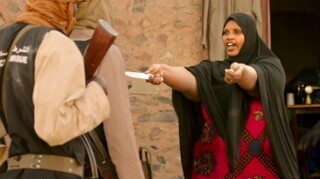‘Timbuktu’
Ursula Lindsey
In his film Timbuktu, Abderrahmane Sissako shows a traditional Muslim society overrun by outsiders claiming they have the God-given authority to tell everyone what to do. The film is inspired by the 2012 takeover of much of Northern Mali by jihadist and other rebel groups. It is both specific to its setting and raises questions about struggles playing out across the Muslim world. I can't think of another creative work that takes such an imaginative, subtle, assured look at Islamist militancy and its effects.
The landscape that Sissako films, dramatic and simple as a stage, is naturally abstract: a lake with perfectly flat shores; a hillside of dunes with a few tents and a few trees; a city of narrow sandy lanes and earth-colored rooftops (Oualata in Mauritania, standing in for Timbuktu).
At first the masked outsiders with their flags and announcements seem bumbling and almost ridiculous, actors playing their part with fragile confidence. A veteran jihadi tries and fails to coach a young member into recording a convincing recruitment video. Fighters track forbidden music floating over the rooftops, only to have to call their superiors for instructions, at a loss when they realise the criminals are singing the praises of the Prophet.
The foreign fighters, like those in Iraq and Syria, come from many different countries. They need interpreters to lecture, threaten and proposition the locals, and even to talk to each other. They repeatedly try to speak Arabic but fall back frustrated on English or French.
The movie captures the way the jihadis mistrust and prohibit the very things that they, like everyone else, love. They smoke banned cigarettes in secret. They talk passionately about football but outlaw the sport. In one of the loveliest scenes in the film, local boys play a match with an imaginary ball. A leading jihadi approaches a woman he is attracted to, gaping and shuffling like an awkward teenager. The first things he says to her is that she should cover her hair.
The locals resist – not heroically but spontaneously. A woman who sells fish at the market gets angry when she is forced to wear gloves – how can she wash and scale her fish? She waves her fleshy young arms at the jihadis and yells at them to go ahead and cut her hands off.
None of the foreign fighters are especially monstrous or cruel; some are quite likable. The community has to take them at their word when they say they act in the name of the religion they all share. The violence, when it comes, is shocking. Two presumed lovers are stoned to death. A condemned man talks of his anxiety and regret at parting from his young daughter.
But the movie’s most maddening scene may be the one in which the local imam and a woman whose daughter has been kidnapped and married off to a fighter make their case, in vain, to the foreign commanders. The men assure them that marrying a girl against her will, without her guardian's knowledge, in the middle of the night, is in accordance with Islam – that they in effect have the authority to define what Islam is. It is clear which side truth and justice are on, which side self-interest and staggering presumption – and how little it matters.
The movie begins and ends with a chase scene, a young creature pursued by armed men in a jeep – exhausted, harried, still alive.

Comments